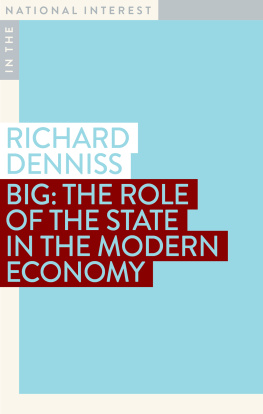Published by:
Triarchy Press
Station Offices
Axminster
Devon
EX13 5PF
United Kingdom
+44 (0)1297 631456
www.triarchypress.net
Richard Davis, 2016
All rights reserved.
No part of this publication may be reproduced, stored in a retrieval system or transmitted in any form or by any means including photocopying, electronic, mechanical, recording or otherwise, without the prior written permission of the publisher.
A catalogue record for this book is available from the British Library.
Print ISBN: 9781909470835
E-ISBN: 978-1-909470-84-2
Foreword
Whichever way you look at it, public services provided for people whose lives have fallen off the rails consume a very large proportion of expenditure. The Whitehall narrative has it that there is an immediate and growing crisis: demand is rising, so who will pay?
Richard Davis shows through an evidence-based narrative that the crisis if we should call it that is a crisis of management, organisation and political policy. In short, we waste hundreds of millions of pounds on ineffective and counter-productive interventions.
The opportunity to radically lower the costs of services is nothing short of breath-taking, to say nothing of the beneficial consequences for peoples lives and the quality of life in communities.
Richard Davis, one of the founding members of Vanguard, is respected by his colleagues and clients for his profundity of insight and practical competence. He has pioneered Vanguards work in this field. As early adopters of the ideas in this book have found, the ideas may challenge conventional wisdom but they are logical, practical and effective.
Anybody involved in services will gain enormous value from the guidance Richard provides. Policy makers, if they take the time to first understand what is described here, will realise that policy should be concerned with the State getting out of the way of people who, if given responsibility, can seize the opportunity to improve services.
In turn, better services will have a profound impact on the level of expenditure. What could be more important?
John Seddon
PART ONE
Introduction
A social services manager discovered for herself how well the system was working for the people it was designed to care for. Her reaction was profound: I felt physically sick. I went home and decided that all I could do was to resign I was responsible for this awful failure. She was not responsible, but her discovery raised an important question: Why have we designed public services in such a way that they fail to deliver what matters? The cost of failure is huge and a waste of public money but, worse, and as the manager discovered, services can sometimes do more harm than good.
I have written this book for those of you who work in the public sector who would like to find real solutions to peoples needs. There is little point in trying to explain how to do this to politicians or public sector leaders. The politicians want simple answers delivered quickly and seem unable to understand why there is a need to rethink the logic and redesign public services; and it is my contention that public sector leaders, influenced by Blairs ruthless pressure to deliver on targets, have developed a Whitehall mentality where the purpose is simply to make the numbers.
It is very difficult to find any useful leadership in the public sector those who might provide focus and inspiration are looking at their performance numbers and not at the public they serve. However, I believe that this is actually good news on another level. It leaves the way open for operational managers and locally elected politicians to become leaders, to take control and make a difference. This is precisely what is happening in the public sector areas that we, Vanguard, are involved in. Historically it was unheard of for the elected members to be part of the work but now they are willing and influential partners giving much needed backing, understanding and enthusiasm to the operational managers.
As it is, the public sector doesnt function very well. This is a statement that can be verified from many viewpoints complaints about the National Health Service (NHS) and police services continue to rise, education standards have stalled, access to social services is ever more difficult and local authorities are struggling to provide what people see as basic services, such as libraries and pothole repairs. My own work in the public sector has shown it to be inefficient and largely ineffective its simply not good at delivering what matters. It is awash with money and yet all that is heard is the clamour for more. We tend to believe the media narrative that the quality of services is directly related to funding and nothing else. We have created a narrative of doom about costs: We are living longer, families are broken, treatments are more expensive, the health and care bill will be out of control.... This is plausible but a non sequitur . There is no evidential link between an ageing population and a much higher need for services, yet it is true in most peoples minds. A recent report in the BMJ .
So why are we in this mess with poorly performing services? As citizens, as humans, we like to attribute success and failure to a group of individuals. It helps us to explain things to ourselves and each other with a convincing narrative. The blame usually falls on a predictable set of suspects the unions, Westminster politicians, the civil service, and the belief that the workforce in frontline public sector organisations are inefficient and badly managed. Vanguards experience, however, is that there is nothing wrong with any particular group of people but that there is much wrong with the system within which they work and of which they have to try and make some sense. Nonetheless, its very difficult to accept an argument that says its not the people who are at fault, its the system thats at fault.
Politicians are responsible for the design and running of the system. They are responsible for making decisions based on knowledge. They are responsible for understanding the connection between the design, the way the public sector works and how the workers behave. And we need to ask those politicians some serious questions about the design when people start blaming the police for being dishonest about their crime statistics!
Every government comes to power promising a better set of policies and practices. It usually rails against the previous governments incompetence and then, somewhere along the line, it decides that it was alright really, that they just didnt do the work properly. Governments are the masters of Ackoffs proposition, that most of our problems arise from doing the wrong thing righter. The public sector workforce and the citizen are told that each new government policy is going to make things better, and yet both end up with different versions of the same ineffectiveness.
Is there an alternative to the current system? And if there is, how would we know if it was any better? Some parts of the system will always be political based on the values that politicians wish to promote. However, most changes should be based on empirical evidence (what works). Current political thinking takes little notice of this. For example, there is a growing body of empirical evidence that shows that children learn better if academic learning is delayed and early learning is focused on socialisation, but UK government policy is instead bolstering academic content in the early years. Recent governments have made great play of evidence-based policies yet regularly ignore the contribution of the experts they consult and employ.













